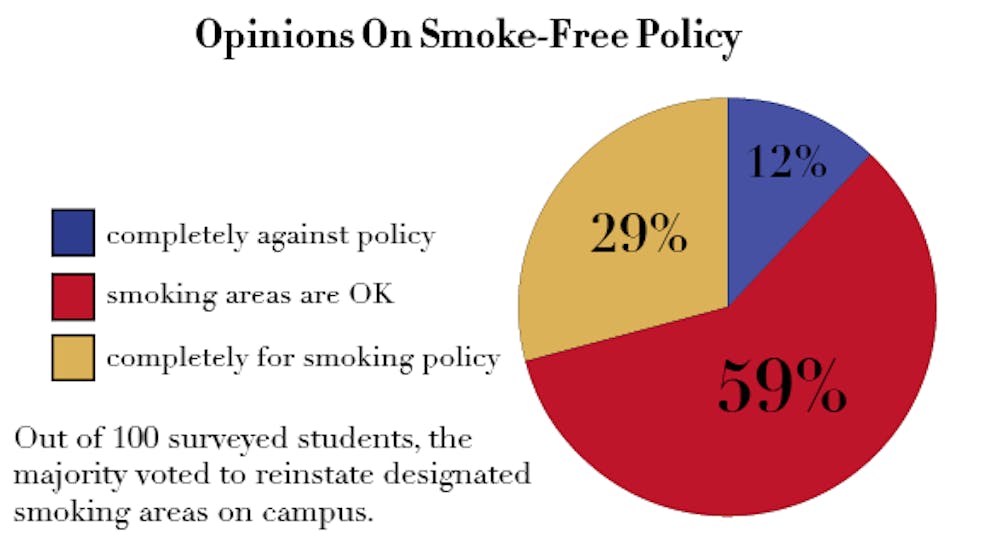I was sitting on a bench behind Roper Hall watching the traffic sail by. I raised a match to my corncob pipe and lit my tobacco, exhaling a long, thick puff of smoke. That bench was in one of AU’s three temporary smoking areas, all of which are now gone because of a plan to join over 4,000 other colleges to become a smoke-free campus.
Prior to six months ago, my smoking experience was pretty much nonexistent (I had taken a puff or two of my father’s cigar once). My middle school’s anti-smoking campaigns worked for me, so I grew up with no desire to smoke (though I did disagree with them when they said it didn’t look cool, the evidence being Steve McQueen).
But on Aug. 9, I checked my e-mail to find a message from President Neil Kerwin announcing the ban of on-campus smoking that would take effect on Aug. 15, 2013. The only exception to this would be three temporary smoking areas, which would all close down in December. Obviously this was an awful time to take up smoking. So I took up smoking.
With all of the smokers congregating in three areas, I knew it would be easy to meet and chat with interesting people from all walks of life. For better or worse (my lungs say “worse”) I was excited to try something new.
Less than a month later, I asked my roommate, a casual smoker, to teach me how to smoke. He took me out to the smoking spot by the Kogod School of Business, I took my first real puff on that cool summer night. Soon after I bought a pipe and began asking people for their opinion of the smoking ban.
The responses that I got from smokers were mostly negative in terms of the smoking ban. “It’s stupid,” “I hate it” and “It’s bull****,” were among the most common responses. “To hell with it!” one professor told me as he puffed away on a cigarette.
Even nonsmokers were against the ban.
“If the school is going to charge us $60,000 a year to come here, students who want to smoke should be able to smoke on campus,” said junior Atrina Mehdipour, a nonsmoker.
And many agreed smoking “areas” were a fair compromise, including nonsmokers. It allowed smokers to smoke without bothering nonsmokers, and it concentrated all of the litter in three small areas.
I heard support for the smoking areas so often, in fact, that I created my own survey, which was posted on various AU Facebook pages and was taken by both undergraduate and graduate students. Students were given three polling options:
1: Completely against the smoke-free policy
2: Middle ground: support the implementation of permanent smoking “areas”
3: Completely support the smoke-free policy
The survey reflected the opinions of nonsmokers and smokers collected over months of conversations. Out of 100 people, 59 respondents voted for option two while only 29 voted for option three and 12 for option one. This shows a clear student approval for a compromise that keeps the smoking areas permanent.
I had previously been told by University administration that survey data showed clear student support for a smoke-free campus. A poll created by the Student Government last fall asked students whether or not the ban was important, but failed to ask students whether or not they actually supported the initiative. The survey also failed to ask students about the temporary smoking spots.
I offered to present my own data to Dean of Students Robert Hradsky and the Student Government. Hradsky agreed to meet with me and after reviewing the survey data, said it was too late in the game for any real change to be made. However, we jokingly discussed the sugar-related chaos that might engulf the school due to all of the smokers being given lollipops by AU’s “Tobacco-Free Ambassadors,” who have been confronting rule-breaking smokers.
When I told the Student Government about my survey, they initially sounded interested in hearing the results and discussing the implications. But upon learning that I was writing this column, they have ended all communication with me despite numerous attempts on my part to contact them.
Now that the smoking spots are closed, I have given up smoking. I only started in the first place to understand students’ opinions on the smoking ban. But in these last few months of smoking, I have made friends by talking to all sorts of interesting people I would have never met otherwise. I’m not advocating smoking—it can still kill you—but what I’ve learned from all of this is that people should be able to make these types of decisions on their own, and the school should respect that freedom.
Connor H. O’Brien is a sophomore in the School of International Service.





